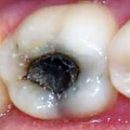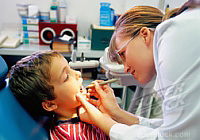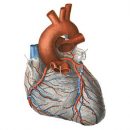What is gingivitis? What are the causes of Gingivita? What are the symptoms of Gingivita? How is the treatment of gingivitis? Answers to these questions you will find in the article.
Content
- Gingivitis, reasons for gingivitis
- What are the symptoms of Gingivita
- How is the treatment of gingivitis
Gingivitis, reasons for gingivitis
Gingivitis is inflammation of gums, accompanied by edema, redness and bleeding. Gingivitis is a fairly common disease; distinguish the sharp, chronic and recurrent form of the disease.
The most common cause of gingivitis is non-compliance with the oral hygiene, as a result of which the dental plaque is formed (colonies of microorganisms, firmly associated with the surface of the tooth). Also in the emergence of gingivitis play the role of factors such as the pathology of bite, dental stone (calcified dental plaque), food remains, incorrectly superimposed seals, oral respiration.
Gingivitis often meets in adolescents and pregnant women. These categories of patients have a disease usually leaks harmful due to hormonal changes in the body.
Also gingivitis can be a sign of systemic disease (for example, herpes, allergies, avitaminosis, leukopenia, depleting disease, diabetes mellitus).
Long-term use of some drugs, such as oral contraceptives, can increase inflammatory phenomena in the gum. Heavy metals (lead, bismuth) are also sometimes able to provoke gingivitis.
What are the symptoms of Gingivita
With gingivitis, the gums are inflamed, there is a swelling, its contour changes. Due to the edema, the gantry groove between the tooth is deepened and the so-called groom pocket is formed. As a result, the following symptoms arise: redness of the gum edge, swelling and bleeding of the gums, the gums becomes sensitive and painful, there are difficulties in chewing and swallowing.
Gingivitis can be both acute and chronic. Chronic gingivitis most often occurs in adults. During the exacerbation, which most often happens in the winter-spring period, the gum bleeding is observed (as a rule, when cleaning the teeth).
How is the treatment of gingivitis
Should be carried out only by a dentist doctor. The treatment of gingivitis is to effect on dental plaques, eliminate local and general predisposing factors.
First of all, it is necessary to carefully observe the oral hygiene. The doctor will provide you with the necessary recommendations.
 In addition, it is often necessary to resort to special means, and not only for the treatment of the acute phase of the disease, but also in order to slow down or stop the development of serious complications.
In addition, it is often necessary to resort to special means, and not only for the treatment of the acute phase of the disease, but also in order to slow down or stop the development of serious complications.
Different drugs are used: antibiotics, anti-inflammatory funds, local immunocormers.
Sometimes a significant medical intervention is required: careful dental removal (mechanically or using ultrasound), replacement and grinding hanging on the gum or poorly fitted seals.
In some cases, surgical intervention is necessary (Curetzh). In case of Cuzurezha, the doctor removes dental deposits using special hooks, excavators, curetles (closed cabinage), or if an operation is required, cutting the gums (Open Curetzh).
In chronic gingivitis, produce the processing of mouth with anti-inflammatory agents and sodium bicarbonate solution.
With gingivitis due to infectious inflammatory processes, it is necessary to eliminate the infection pathogen. Therefore, the doctor may prescribe antibacterial agents or antifungal drug.
Gingivitis often indicates a decrease in its own protective forces of the body. Therefore, treatment should be directed not only to the elimination of the inflammatory process, but also on improving immunity. Then the most justified the use of immunocormers. Preparations of this group activate the protective forces of the oral mucosa. Acting through the system of immunological mechanisms, they contribute to the strengthening of phagocytic activity (phagocytosis - seizure and neutralization of bacteria by cells of the immune system), an increase in the content in the saliva of a special enzyme - lysozyme, known to its bactericidal activity, stimulation and an increase in the number of immunocompetent cells responsible for the production of antibodies. Immocorrectors include the drug Imudon.









